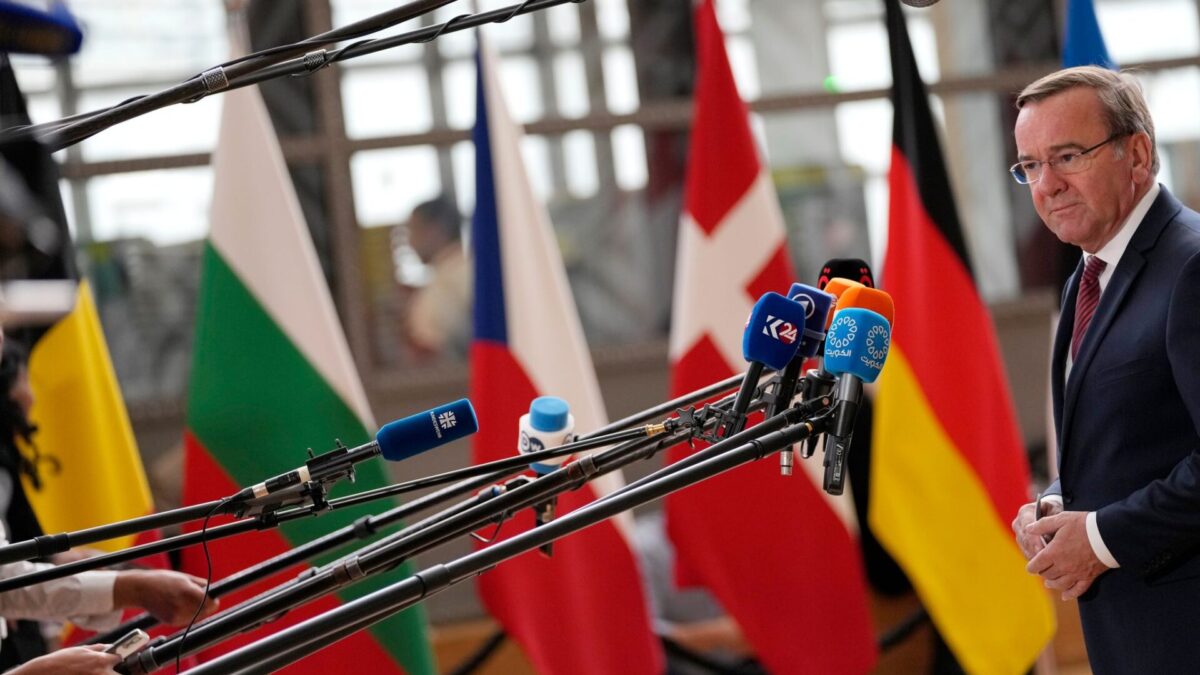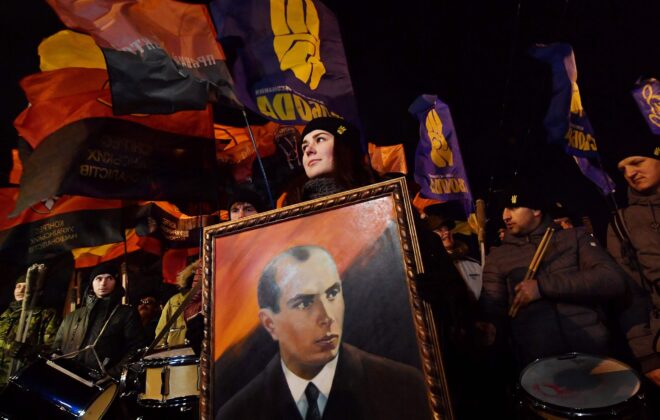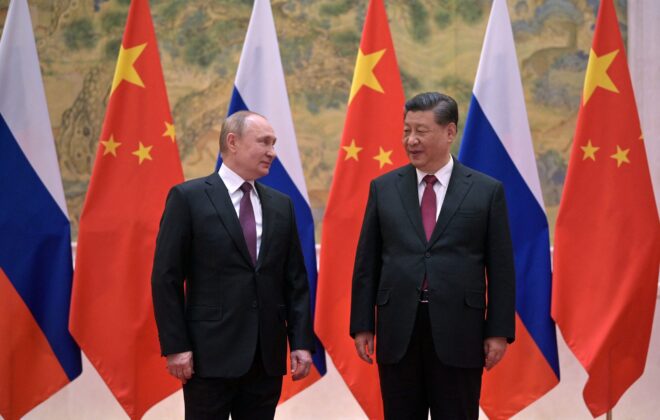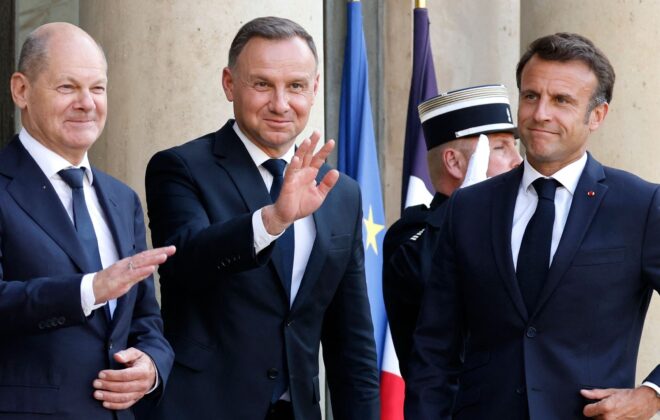The Russia-Ukraine War in Germany IX. Conclusion: Defence of Europe through military support for Ukraine.
Putin is not only concerned with Ukraine in this war; the conquest of the whole of Ukraine is his ostensible military goal. Beyond the crushing of Ukraine, the revisionist Putin wants to destroy the European order that was established after the end of the Cold War – also with Russia’s participation. He seeks Russian domination over all of Eastern and East-Central Europe, as it existed in the 19th century and after World War II. Therefore, Putin’s war against Ukraine is also a war against the European Union, in which the states of the former “Eastern Bloc” are now united with “Western Europe”.
After failing to reorganise Europe to include Russia in his interests (the Moscow initiatives “Free Trade from Lisbon to Vladivostok” and “Pan-European Security Architecture from the Atlantic to the Pacific”1) – Putin now wants to ruin the European Union. Through political and economic destabilisation, through the use of natural gas as a weapon, through the support of anti-European, national-populist movements, through the propagation of polarising fake news, through the stoking of tensions between member states, through the indirect promotion of famine migration from Africa as a result of the Ukraine war, Putin is pursuing the disintegration of the European Union from within – as a reenactment of the disintegration of his Soviet Union three decades ago. He is concerned with the destruction of the foundations of the “European way of life”, the way Europeans live today and want to live tomorrow.
During the war in Afghanistan (2001-2021), Germany was “defended in the Hindu Kush”, according to the then German Defence Minister Peter Struck (2002-2005); today Europe is actually defended in Ukraine. Military support for Ukraine is an imperative of European security. This insight has slowly become accepted in Brussels and in European capitals, which is why not only the USA but also the European states – albeit hesitantly at first – agreed to supply weapons to Ukraine.
The regionalisation of the war sought by the West, its limitation to Ukraine, will not succeed. (The regionalisation of the conflict between Austria-Hungary and Serbia, its limitation to the Balkans, was already unsuccessful in 1914). After only a few weeks, the consequences of the war affected the whole of Europe (keyword: energy shortage), and indeed the whole world (keyword: grain shortage), with enormous price increases as a consequence.
Putin will wage war – whatever the cost (to Russia). His paranoid mental state does not allow a retreat, let alone defeat. Therefore, the cost of war to Russia must be increased. Ukraine must be defended – “whatever it takes” in the words of Mario Draghi, the former president of the European Central Bank (2011-2019, who saved the EURO in its most serious crisis to date with this expression of determination in London in 2012.
The West must maintain the supply of weapons to Ukraine “as long as necessary” (Olaf Scholz, “as long as it takes”) – weapons of higher “effectiveness” than the weapons with which Ukraine is attacked by Russia. So the West has not only a moral obligation to stand by Ukraine against the Russian aggressor; probably not for the USA, but for the European Union its security is at stake; military support for Ukraine is therefore in its very own vital interest.
In Warsaw, the government has understood that Poland itself is in danger of the war. Poland is therefore supplying weapons from its own stocks, something the German government was unwilling to do for a long time. (Decades of neglect of the Bundeswehr have made it technically and materially impossible to secure Germany’s own national defence and to fulfil German obligations towards NATO.2
“Na Berlin!” – “Off to Berlin!”
Perhaps Germany’s government would have been more willing to deliver heavy arms to Ukraine if the responsible politicians would have seen the slogan painted on downed Russian tanks and rockets: “Off to Berlin!” (“na Berlin!”). Magomed Daudov, the president of the “parliament” of the (autonomous) Chechen Republic, prophesied that Chechen troops would march through to Berlin: “If Vladimir Putin doesn’t stop us, God willing, then we will also reach Berlin.” In the TV show “ Evening with Vladimir Solov’ëv” (“Večer s Vladimirom Solov’ёvym”) Berlin is increasingly “the target of aggressive rhetoric: A nuclear missile would reach Berlin in 106 seconds. Even if “Berlin” has not yet been named as a destination by Putin himself, such statements reveal the spirit that prevails in Russia. The Berlin mantra – “Security only with, not against Russia” – no longer applies since February 24, 2022.
Ukraine defends Europe on Ukrainian soil; by defending their freedom, Ukrainians are defending the freedom of Europe. And because the citizens of the European Union do not want to fight themselves, supplying arms to struggling Ukraine is the least the EU can – and must – do. All other aid, the financial support of the Ukrainian budget, the generous reception of Ukrainian refugees and also the political support of Ukraine in international bodies are important, but of secondary importance as long as the war lasts.
It goes without saying that the European Union after the war is won – a defeated Ukraine will no longer be able to receive any help – supports the reconstruction of Ukraine in the dimensions of the Economic Recovery Act3 (“Marshall Plan”). The question arises how many capable men between the ages of 18 and 60 will still be alive to rebuild Ukraine – and how many of the Ukrainian women who fled to the West with their children and are now enriching Western labour markets will return to Ukraine. But talking about “peace” is premature. The tasks awaiting Ukraine – and the West – after the war are self-explanatory, but first the war must be won by Ukraine.
Ukraine’s relationship with Russia will remain shattered for generations – as will that of the West with Russia. Ukraine’s first “peace task” will be to build an “eastern wall” to prevent another conventional Russian invasion.
Fußnoten
- See Winfried Schneider-Deters: Ukraine’s Fateful Years 2013 – 2019, Stuttgart (IBIDEM) 2022, Volume II, Chapter IV.10.
- „Die Bundeswehr (Germany’s Armed Forces) […] steht mehr oder weniger blank da“ (“The Bundeswehr […] is more or less blank”) wrote Lieutenant General and 21st Inspector of the Army, Alfons Mais on LinkedIn https://www.linkedin.com/feed/update/urn:li:activity:6902486582067044353/.
- The Economic Recovery Act, signed by US President Truman on April 3, 1948 and known as the “Marshall Plan” (named after Secretary of State George Marshall), was instrumental in the post-WWII reconstruction of Europe.





